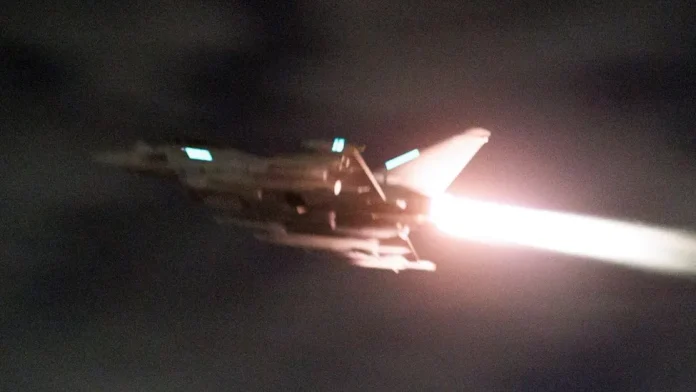The latest round of strikes on Houthi targets in Yemen are “not an escalation” of the conflict, Defence Secretary Grant Shapps has said.
The Ministry of Defence confirmed that three sites were hit by RAF Typhoon jets on Saturday night.
More than 30 targets were struck in the third wave of joint UK and US attacks on the Iran-backed group.
It comes after the US hit sites Syria and Iraq on Friday, following a deadly attack on a US military base.
On Saturday, 36 Houthi targets across 13 locations in Yemen were hit by air strikes from a coalition of eight countries.
Houthis have been targeting ships they say are linked to Israel and the West that travel through the important Red Sea trade route.
UK Prime Minister Rishi Sunak said recent attacks on UK and international vessels were “unacceptable”. “It’s our duty to protect innocent lives and preserve freedom,” he said.
Mr Shapps said the latest strikes were not an escalation in hostilities, but instead were designed “to protect innocent lives and preserve freedom of navigation”.
He added that he was confident they had “further degraded the Houthis’ capabilities”.
The UK and US attacks were supported by forces from Australia, Bahrain, Canada, Denmark, the Netherlands and New Zealand.
In a joint statement, the countries said they were acting in response to continued attacks on ships in the Red Sea.
They said they were specifically targeting sites associated with “deeply buried weapons storage facilities, missile systems and launchers, air defence systems, and radars”.
RAF Typhoon FGR4s flying from RAF Akrotiri military base in Cyprus were responsible for hitting three of the targets, the Ministry of Defence has said, which were “identified using careful intelligence analysis”.
These include two stations – one in As Salif and the other in Al Munirah – that the UK believes were used to control Houthi drones, as well as a “significant” number of targets in Bani.
The Ministry of Defence said the air strikes were “very carefully planned to ensure minimal risk of civilian casualties”.
Foreign Secretary Lord Cameron said the Houthi attacks “must stop”, saying the third wave of joint UK and US air strikes on Saturday took place after “repeated warnings” to the rebel militant group.
Posting on X, formerly Twitter, on Sunday, he said: “Their reckless actions are putting innocent lives at risk, threatening the freedom of navigation and destabilising the region.”
US Secretary of Defense Lloyd Austin said a message was being sent to the Houthis that they will “continue to bear further consequences” if they do not stop their Red Sea attacks.
The joint action came a day after the US launched its own strikes in Syria and Iraq.
They were targeting an Iran-backed militia group which the US has blamed for a drone attack on a military base that killed three soldiers.
Iran – which has previously denied playing a role in that drone attack – said the strikes “will have no result other than intensifying tensions and instability in the region”.
Following days of ction against Iran-backed groups by the UK and US, Foreign Secretary Lord Cameron told The Sunday Times that the country must be “held accountable” for its proxies.
“We need to send the strongest possible signal to Iran that what they’re doing through their proxies is unacceptable,” he said.
Lord Cameron said he has told Iran’s foreign minister that “you created them, you backed them, you financed them, you provided them with weapons, and you will ultimately be held accountable for what they do.”
The Houthis began attacking merchant vessels last November, saying they were responding to Israel’s military ground operation in Gaza.
Since then, the group has launched dozens of attacks on commercial tankers passing through the Red Sea, one of the world’s busiest shipping lanes.
In response, the US and UK launched a wave of air strikes against dozens of Houthi targets on 11 January.













